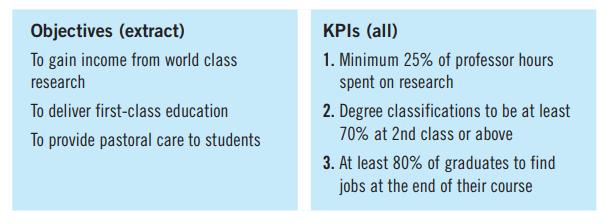June 2021
Geoff Cordwell examines the topic of performance management in the not-for-profit sector.
One of the most common exam questions in the ACCA’s APM exam surrounds KPIs.
In my opinion the examiner believes that many performance management systems lag behind the environment in which the business operates or otherwise do not fit with the businesses mission or purpose (see a previous article in PQ magazine, August 2020).
This is why the examiner is keen that students can evaluate an existing KPI system against the businesses’ objectives or the environment in which it is in.
Evaluation is a critical skill and without it, passing this exam will be difficult, so let’s explore how to evaluate a KPI system:
The most common issues with an existing KPI system in the exam will often be:
• An objective for which there is no KPI. So a simple gap.
• A KPI that is in some way badly set (it is a number rather than a percentage for example).
• The KPI that could be easily be manipulated by staff.
• The KPI is unrealistic or unachievable.
• The KPI is outside the control of the organisation or the individual made responsible for it.
A student could easily use the above as a checklist, but one must remember that the KPIs are much more likely to be non-financial or non-traditional due to the nature of these organisations, so being able to think clearly in the exam will be important.
Equally, the SMART mnemonic is another excellent way of thinking about the suitability of KPIs.
• Is the KPI Specific enough? Does it use generic ‘performance’ phrases for example, or does it ignore the segments within the business?
• Is the KPI Measurable? All KPI systems should have a reliable measurement system to back it up and the KPI itself must be capable of measurement. Most things are measurable with the use of a scale system but is the KPI, as given, inherently measurable is key.
• Is the KPI Achievable? A little stretch is sensible to get the best out of people but if the target is too difficult then it could be ignored.
• Is the KPI Relevant to the businesses’ environment and mission? Inconsistency here undermines the KPI system.
• Does the KPI have a Time boundary? When does the KPI have to be achieved by?
Let’s consider a university as an example. Suppose a University has the following agreed objectives and KPI system:

How can we ‘evaluate’ this KPI system?
Approaches could vary but perhaps the best way forward here is to consider each mission statement in turn and then evaluate the related KPI?
To gain income from world class research:
The relevant KPI is number one above. However, there are issues here.
While one would hope that spending time on research would be fruitful, the KPI simply demands that time is spent and there is no mention of income production for the university.
This could mean ‘pet’ projects are worked on rather than those more likely to be financially successful.
To deliver first-class education:
One has to consider what constitutes a first-class education. Both the second and third KPIs above seem to be relevant. Degree results that are ‘good’ would seem to support the mission as stated. One wonders whether the target is sufficiently challenging or whether a target involving the proportion of first-class degrees might be more appropriate? Another problem with this KPI should occur to you. A typical university sets and marks its own exams and whilst the process may well be moderated one has to questions whether this KPI is too easily manipulated by generous marking?
Equally, one could argue that for a degree to have real value then a job should follow thereafter. In this sense the third KPI is at least relevant.
However, would any job be okay? Perhaps the KPI lacks specificity and a graduate job should be specified?
To provide pastoral care to students:
This mission objective is not dealt with at all by the stated KPIs. If and only if the examiner asked you to provide one, then you should do so. Perhaps having a KPI which targeted that access to care was offered within two days of a request would be appropriate?
Your evaluation needs to be balanced and see the positives and the negatives of the existing system. Typically, however, you should expect to find more negatives with an existing KPI system in the APM exam.
Virtually every APM exam contains questions on KPIs, it is clearly the most common of exam questions. A student simply must be able to evaluate an existing system well.
• Geoff Cordwell is an ACCA APM specialist online tutor providing tuition, revision and mock courses for June 21 and September 21 onwards. See www.geoffcordwell.com and FMELearnonline.com Geoff regularly posts free content on LinkedIn: https://www.linkedin.com/in/geoff-cordwell-96873316/




